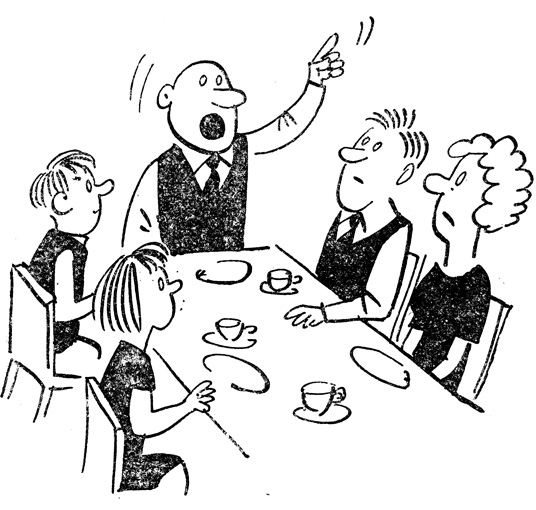
The Weekend
Most people in Britain work a five-day week, from Monday to Friday; schools, colleges and universities are also closed on Saturdays and Sundays. Therefore from Friday evening till Monday morning people are usually free.

Everyone looks forward to the weekend and when Friday comes along, as people leave work they say to each other, 'Have a nice weekend." Then on Monday morning they ask,
"Did you have a nice weekend?" or "What did you do at the weekend?"
Students, young people working away from home and single people in general like to go away for the weekend. They may go home, go to stay with relatives or friends in different parts of the country, or stay in a hotel or boarding house in the country or at the sea. Most towns in England are not more than four hours apart by train and many are much less. For example the London - Birmingham train takes lVa hours, the London - Bristol - 21/2; and no one in England lives more than 100 miles from the sea. Therefore it is possible to leave straight from work on Friday and come back on Sunday evening. It is of course more difficult for married couples with children to go away for the weekend. They do so sometimes but, as they usually have a house, they more often have people to stay.
Those who stay at home at the weekend try both to relax and to catch up with all the jobs they are too busy to do during the week. For women who go out to work these include housework, sewing, washing, shopping and sometimes gardening; for men - repairs and other odd jobs in the house, cleaning the car, mowing the lawn and gardening.
Saturday morning is a very busy time for shopping, as this is the only day when people who are at work can shop for any length of time. On weekdays shops close between 5.30 and 6.00 p. m. and they are closed all day on Sunday (except for newsagents and some small grocers and confectioners). On Saturdays the shops in the centre of big cities usually close at 1 p. m.; in the suburbs and small towns they stay open till 5.30 or 6.00 p. m. as on weekdays (though they have an "early closing day" in the week to make up for it).
On Saturday afternoon the most important sporting events of the week take place - football, rugby (in the summer, cricket and tennis), horse-racing, car and motor-cycle racing and other sports. Some men go and watch, others sit and watch the sports programmes on television. In the late afternoon the sports results are announced on radio and television and the sports editions of the evening papers are on sale.
Saturday evening is the favourite time for parties, dances, going to the pictures or the theatre, in fact for "going out" generally. For many people it is the climax of the weekend. There is plenty of time to get ready and no one has to worry about getting up early for work the next day.
Having gone to bed late the night before, many people have a lie-in on Sunday morning. When they finally get up they have a leisurely breakfast. Some have breakfast in bed, although this depends on your having someone willing to get it and bring it up. However, some breakfast-in-bed enthusiasts will even get up, get breakfast themselves and take it back to bed. While having breakfast people start reading the Sunday papers, which they either fetch themselves from the local paper shop or have delivered by the paper boy for a small extra charge. There are at least eight papers which are published weekly on Sunday (though some are the Sunday version of a daily paper). They range from serious papers of 60 or 70 pages, which publish the week's news, together with articles on political, social and cultural topics, to those which specialize in crude sensationalism. It is quite usual for a family to have two or three Sunday papers, and some enthusiasts have more. These people have little time for anything else on Sunday and spend the day submerged in a sea of newspapers.
If the weather is fine, people may decide to go out for the day. Often, however, having got up late in any case, they wait till after dinner, which is at 1 or 1.30. Sunday dinner is traditionally the most important family meal of the week. Most people have a "joint" (a piece of meat for roasting in the oven), which is roasted, then carved and served with roast and boiled potatoes and one or more other vegetables, such as peas or cabbage, and gravy. Then comes the pudding, for example apple pie and custard, and finally tea or coffee.
This meal induces in most people a state of inertia, and they sit talking, reading the paper, watching television or just dozing, until tea time. In the summer they sit in the garden and more energetic people go out for a walk or to see friends. After what often seems quite a short while it is tea time, that is 5 - 5.30. Besides the all-important tea there are sandwiches, sometimes cold meat and salad, fruit and cream, bread and butter and jam, and cakes. Quite often friends are invited to Sunday tea.
Some people spend Sunday evening quietly at home, others go to see friends, go to a concert or film, or go out for a drink. The realization that the weekend is nearly over casts a slight melancholy on the evening.
|
ПОИСК:
|
© GENLING.RU, 2001-2021
При использовании материалов сайта активная ссылка обязательна:
http://genling.ru/ 'Общее языкознание'
При использовании материалов сайта активная ссылка обязательна:
http://genling.ru/ 'Общее языкознание'